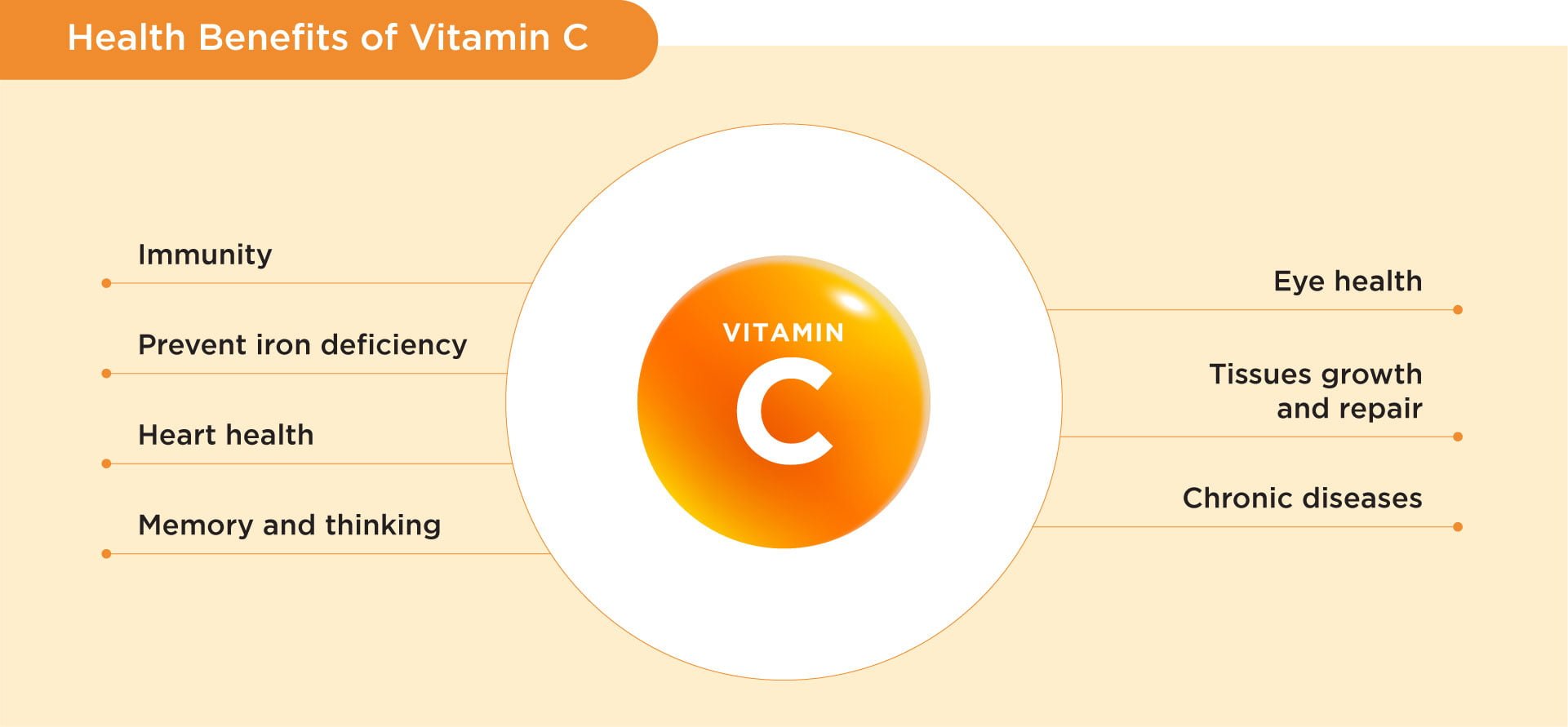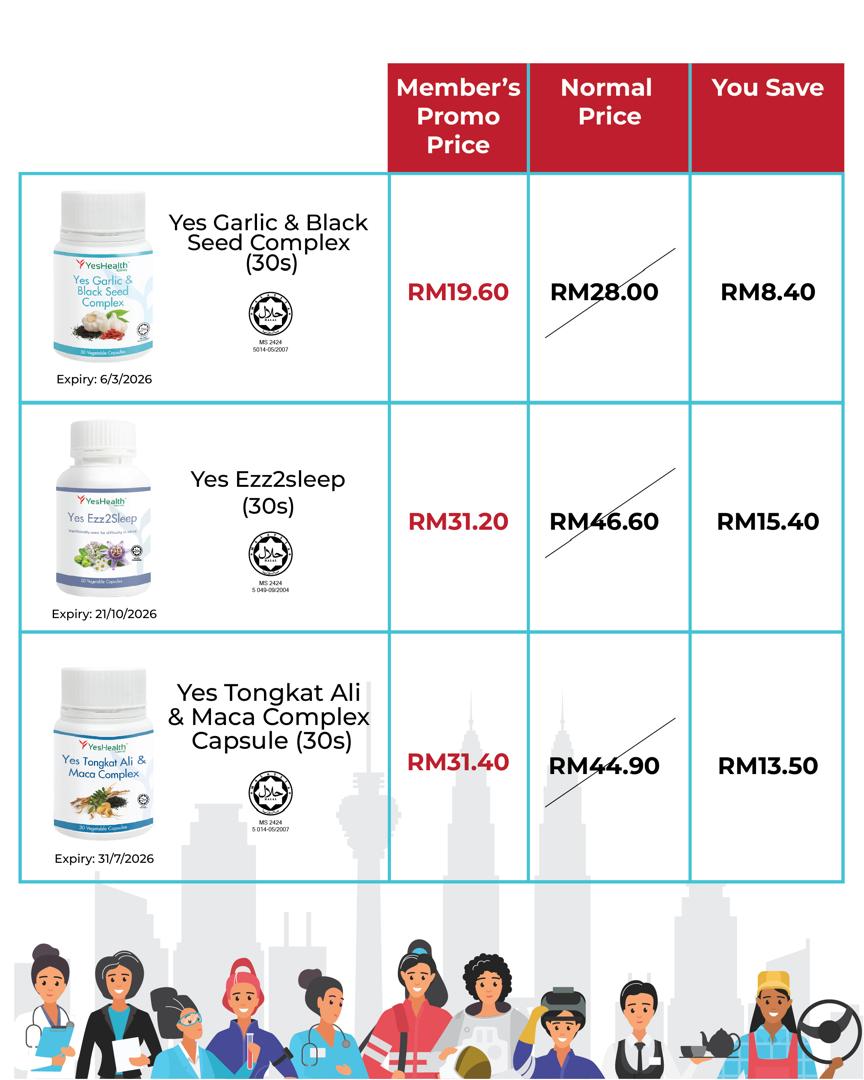Vitamin C

Vitamin C
Vitamin C is an essential water-soluble vitamin that is not stored in the body, meaning that your body can’t produce it. It should be obtained from diet and/or supplement. Vitamin C is found in citrus fruits, berries, potatoes, tomatoes, peppers, cabbage, Brussels sprouts, broccoli and spinach 1.
Most people are able to get enough vitamin C from a healthy diet. While these groups of people include smokers, patients who suffer from certain gastrointestinal conditions or cancer, and those who have a limited diet are more likely to have vitamin C deficiency 1.
Published Health Benefits
1. Immunity
Vitamin C helps to boost the production and efficiency of white blood cells while protecting them from damage by potentially harmful molecules, such as free radicals 2. It also acts as an antioxidant to strengthen the skin’s defense system 3.
2. Eye health
Vitamin C can protect eyes against damaging free radicals and can help to prevent the progression of age-related macular degeneration (AMD) 4.
3. Tissues growth and repair
Studies have shown that taking vitamin C can help heal wounds and form scar tissue faster 5. Vitamin C also helps to form important proteins found in the skin, tendons, ligaments, and blood vessels 5.
4. Prevent iron deficiency
Vitamin C improves the absorption of plant-based iron source, which is useful for people who are on meat-free diet 6.
5. Heart health
Studies have found that taking vitamin C can lower blood pressure in both healthy adults and those with high blood pressure. Vitamin C act as a diuretic to remove excess fluid from the body which can help to lower the pressure within the blood vessels 7.
6. Chronic diseases
Vitamin C is a powerful antioxidant that can increase blood antioxidant levels, thus helping to reduce risk of chronic diseases like heart disease 8.
7. Memory and thinking
High intake of vitamin C shows protective effects on thinking skills and memory as you age 9.
Recommended Daily Dose
The recommended daily amount of vitamin C is 90mg for adult men and 75mg for adult women. For smokers, add 35mg to the adult recommended dose 10.
References:
1. Vitamin C. (2020). Retrieved 24 September 2021, from https://www.mayoclinic.org/drugs-supplements-vitamin-c/art-20363932
2. Huijskens, M., Walczak, M., Koller, N., Briedé, J., Senden-Gijsbers, B., & Schnijderberg, M. et al. (2014). Technical Advance: Ascorbic acid induces development of double-positive T cells from human hematopoietic stem cells in the absence of stromal cells. Journal Of Leukocyte Biology, 96(6), 1165-1175. doi: 10.1189/jlb.1ta0214-121rr
3. Fuchs, J., & Kern, H. (1998). Modulation of UV-light-induced skin inflammation by d-alpha-tocopherol and l-ascorbic acid: a clinical study using solar simulated radiation. Free Radical Biology And Medicine, 25(9), 1006-1012. doi: 10.1016/s0891-5849(98)00132-4
4. Age-Related Eye Disease Study Research Group (2001). A randomized, placebo-controlled, clinical trial of high-dose supplementation with vitamins C and E, beta carotene, and zinc for age-related macular degeneration and vision loss: AREDS report no. 8. Archives of ophthalmology (Chicago, Ill. : 1960), 119(10), 1417–1436. doi: 10.1001/archopht.119.10.1417
5. Desneves, K., Todorovic, B., Cassar, A., & Cr17owe, T. (2005). Treatment with supplementary arginine, vitamin C and zinc in patients with pressure ulcers: A randomised controlled trial. Clinical Nutrition, 24(6), 979-987. doi: 10.1016/j.clnu.2005.06.011
6. Hurrell, R., & Egli, I. (2010). Iron bioavailability and dietary reference values. The American Journal Of Clinical Nutrition, 91(5), 1461S-1467S. doi: 10.3945/ajcn.2010.28674f
7. Juraschek, S. P., Guallar, E., Appel, L. J., & Miller, E. R., 3rd (2012). Effects of vitamin C supplementation on blood pressure: a meta-analysis of randomized controlled trials. The American journal of clinical nutrition, 95(5), 1079–1088. doi: 10.3945/ajcn.111.027995
8. Kim, M. K., Sasazuki, S., Sasaki, S., Okubo, S., Hayashi, M., & Tsugane, S. (2003). Effect of five-year supplementation of vitamin C on serum vitamin C concentration and consumption of vegetables and fruits in middle-aged Japanese: a randomized controlled trial. Journal of the American College of Nutrition, 22(3), 208–216. doi: 10.1080/07315724.2003.10719295
9. Paleologos, M., Cumming, R. G., & Lazarus, R. (1998). Cohort study of vitamin C intake and cognitive impairment. American journal of epidemiology, 148(1), 45–50. doi: 10.1093/oxfordjournals.aje.a009559
10. Office of Dietary Supplements – Vitamin C. (2021). Retrieved 27 September 2021, from https://ods.od.nih.gov/factsheets/VitaminC-Consumer/









